
The Linux QuickStudy Laminated Reference Guide is a powerful resource for anyone diving into the world of Linux. This guide, crafted by John Hales, simplifies complex Linux concepts into an accessible format, making it an invaluable tool for both beginners and seasoned users. In this article, we’ll explore the key features and benefits of this guide, ensuring you maximize your Linux knowledge.
Product Features
| Feature | Details |
|---|---|
| Product Name | Linux QuickStudy Laminated Reference Guide |
| Manufacturer | John Hales |
| Category | Books |
| Customer Review Count | 1029 |
| Customer Rating | 4.7 out of 5 |
| Key Topics Covered | Logging in & out, User & group manipulation, LINUX shells & command line, File system, I/O redirection, Wildcards & VI editor, Permissions & ownership, Shell & user variables, FTP, Archiving files & directories, Login shell scripts, Job control & processes, Command summary |
Product Overview
| Pros | Cons |
|---|---|
| Comprehensive coverage of Linux topics | May be overwhelming for absolute beginners |
| Laminated for durability and easy reference | Limited depth on advanced topics |
| Easy-to-read layout | Does not include interactive resources |
Understanding Linux and Its Importance
The Linux QuickStudy Reference Guide is an invaluable asset for anyone keen on mastering Linux, whether you’re just starting or looking to deepen your knowledge. As I flip through the sections, I can’t help but appreciate how each part is meticulously organized to facilitate easy access to information. For example, the sections on command line basics are particularly engaging for newcomers. I find that they provide concise explanations alongside practical examples, which really helps in demystifying the terminal experience.
One of the features I leverage often is the quick reference summaries. They allow me to swiftly compare commands and understand their functions without flipping through pages of documentation. I also appreciate the clear syntax notations that indicate the difference between options and arguments. This aspect is crucial in helping me refine my command line proficiency.
Furthermore, leveraging the troubleshooting tips found within the guide has saved me a considerable amount of time when debugging issues. I can easily locate common problems and their solutions, thereby empowering me to tackle challenges with confidence. Using this guide, I feel more connected to the Linux community, as it encourages a hands-on approach to learning and applying concepts. Each session with the guide boosts my skills, reinforcing my understanding of essential Linux principles in a practical, engaging manner.
Utilizing the Linux QuickStudy Reference Guide Effectively
The Linux QuickStudy Reference Guide is a remarkable tool that I find invaluable in my journey through the intricacies of Linux. To utilize this guide effectively, I recommend first familiarizing yourself with its layout. Each section is thoughtfully crafted, covering everything from basic commands to advanced system administration tasks. When I first approached the guide, I was overwhelmed by its wealth of information, but I soon discovered that a systematic approach makes all the difference.
For instance, as I navigated through the command line basics, I realized how the guide presents essential commands like
One feature I particularly appreciate is the summary tables and quick-reference charts. These tools enable me to quickly look up syntax without sifting through extensive manuals, which saves me precious time during crunch moments. As I delve deeper into shell scripting and system services, I find that revisiting the guide at each stage strengthens my command line proficiency and deepens my understanding of Linux concepts. Overall, leveraging the Linux QuickStudy Reference Guide transforms the learning experience into an engaging and productive journey.
Conclusions
The Linux QuickStudy Laminated Reference Guide is an exceptional resource for anyone seeking to enhance their Linux knowledge. Its clear layout and comprehensive coverage make it suitable for both beginners and experienced users. By utilizing this guide, you’ll undoubtedly find it easier to grasp Linux concepts and apply them effectively in your own projects.